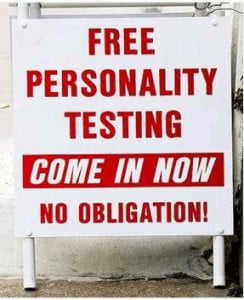Understanding the personalities of your prospects and customers can help you sell more products and services. It can also give you a competitive edge in the market.
Although the types of products and services within your industry may evolve over the years, personalities of your audience stay pretty much the same. This is why you should focus more attention on your buyers then you may realize.
The way to do this is to master the skill of identifying customer personality types and styles. By knowing your customer’s personality type, your company can tailor its marketing communication to build trust and break down their resistance to buy. According to Trish Wend, a marketing executive at TQM,
"People want to do business with companies who are most like themselves…if the person getting an email from a company is a very task-driven person and the email has a lot of details, they won't read it."
4 Types of Personalities
In general there are four kinds of buyers. These include “thinkers,” “drivers,” “expressives” and “feelers.” Each kind differs in how they process information, respond to advertising and make their buying decision.
Thinkers
Thinkers, also considered analytical types, are highly organized and conservative. They are not risk-takers. They like the facts, details and examples that prove and justify the value of the product before making their decision to buy. They want to see the credibility behind your product. Thinkers are numbers oriented and want to now the “bottom-line.” Of all the four types, thinkers are the most unlikely to make an impulsive buying decision. Therefore, they are perhaps the most difficult kind of buyer to sell a new product or technology.
Drivers
Drivers, sometimes called masterminds, are fast-paced. They are always busy and want to get right to the point quickly. They like to have power, be in control and work independently. Drivers are risk takers with a strong focus on immediate results. They like to have choices, but make their decisions based on trust, logic and reality. So you must make a strong and good first impression to get them to buy.
Expressives
Expressives, also called Olympians, are dreamers. They are risk takers who crave excitement and energy. They want to entertain and be entertained. Expressives prefer long presentations that dazzle their imagination and get them to dream about lofty goals and aspirations. They see the big picture and believe in possibilities. And they buy with their intuition and their heart.
Feelers
Feelers, also called diplomats, are amiable. They are friendly, likeable, compassionate and sensitive and loyal to other people. They like to build relationships and want to help others. Feelers are not risk takers and often need the support of other people before making a decision. They can sometimes be “wishy-washy” in their buying decision process. Feelers respond best to empathy and rock-solid guarantees.
2 Ways to Identify Your Customers Personality
There are two ways you can identify your customer’s personality. These include an online personality test and through testimonials.

The most direct way to find out your buyer’s personality is to get them to take a personality test. You can do this in the form of a quiz. After each person completes the quiz you could add the responses to your customer database. This can help you customize the right response in an email that promotes your product or service.
Testimonials
Testimonials are appealing for readers. Give your audience a snippet of four different testimonials. Link each snippet to the full testimonial on a page that caters content to one of the four personality types.
Each snippet would correspond to a different personality. So in essence, the snippet would likely attract the type of personality that is motivated by its content. For example, a snippet of a testimonial that is full of facts and details would more likely attract a buyer with a thinker personality than it would attract a buyer with a feeler personality.
Advice Worth Following
Knowing your customers personality type does not guarantee you’ll make the sale. What matters most is creating the right message for each personality type. In other words, it is best to first understand your customer before expecting them to understand your product or service.



Submit a Comment
Your email address will not be published. Required fields are marked *